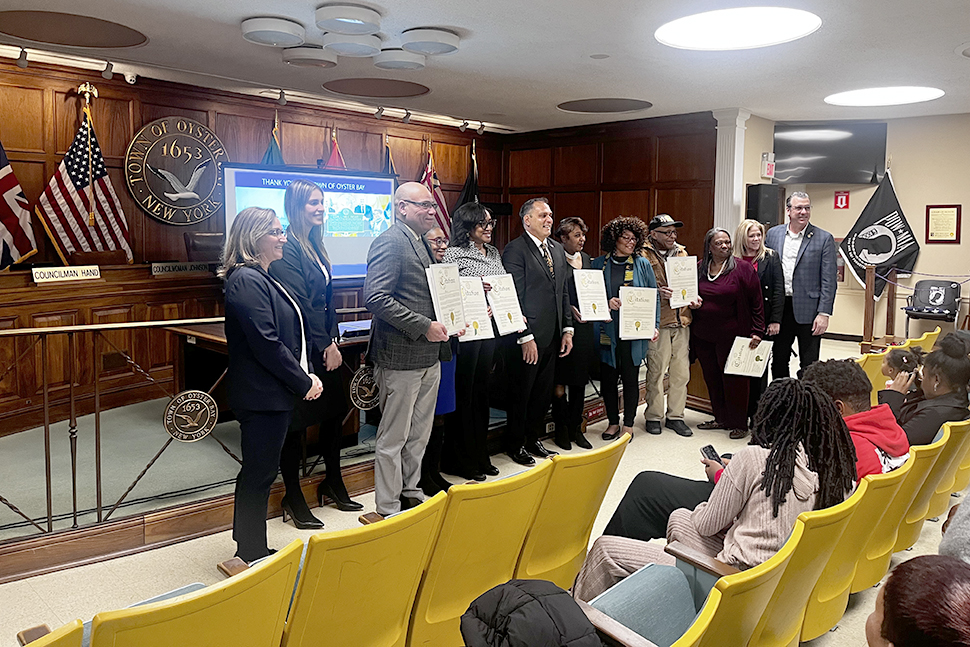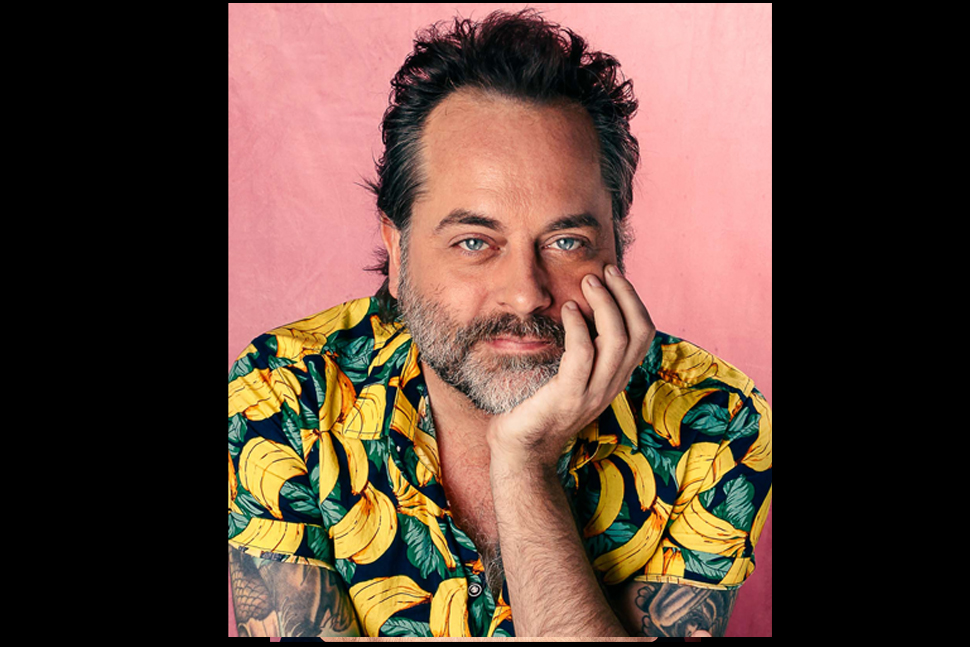“Black history is American history” was the message of an evening at the Oyster Bay Town Hall North, which was lit with the colors of the Black History Month flag: green, black and red, on Feb. 22.
“African American culture has profoundly shaped American culture in music and art and literature and sports and that list goes on and on,” said Town of Oyster Bay Supervisor Joseph Saladino.
Elected officials, such as Town of North Hempstead Supervisor Jen DeSena, New York State Sen. Steven Rhoads and Nassau County Legislators Samantha Goetz and Arnold W. Drucker, community leaders including Phyllis Hill Slater of the Long Island Small Business Assistance Corporation and historians, including Carol A. Gordon and Dr. Denice Evans-Sheppard, gathered at Town Hall for an evening of programs celebrating Black History Month.
Black History Month came from a tradition started by Harvard graduate Dr. Carter G. Woodson, who launched a Black history week in February 1926, according to the Association for the Study of African American Life and History. It is said Woodson chose February because of the birthdays of Abraham Lincoln and Frederick Douglass.
The shift to a month-long celebration began before Dr. Woodson’s death in 1950. And since the mid-1970s, every president, Democratic or Republican, has issued proclamations endorsing the annual theme of Black History Month.
“The Civil Rights Movement grew out of church basements, word of mouth and people coming together and many times they had to do it in secrecy,” Supervisor Saladino said, later adding “With today’s modern technology, and everyone so interconnected, the struggle to effect positive change continues through the strength and will of everyday Americans. That change includes equal opportunity and education, employment, fair treatment under the law and we must always work to create that equity and equality.”
Among the speakers who followed Saladino was Deputy County Executive for Health & Human Services Anissa Moore, who was representing County Executive Bruce Blakeman. Moore said programs like these are important, especially at a time when history is being forgotten.
“You can not move forward; you can not progress without understanding history,” Moore said. “A rich piece of African American history is that we have to start pre-slavery… There were free people as early as 1626 who came and were already working the land, and they were building and they were the business owners of that time.”
Days after the program, on Feb. 27, the Town of Oyster Bay officially unveiled a historic marker at Pine Hollow Road to mark the story of Civil War veteran David Carll.
“David was a free Black man who volunteered in 1864 to serve the United States of America in the 26th New York United States Colored Troop Regiment, that’s what it was called,” Saladino said. “It was funded through a government stipend by philanthropists, including James Roosevelt, the uncle of President Theodore Roosevelt. Upon returning home after the war in 1865, soon after President Abraham Lincoln signed the Emancipation Proclamation, David Carll and his wife, Mary Louisa Appleford Carll, purchased land in the Pine Hollow community that continues to house the six generations of his descendants who have lived in that house to this day.”

(Photo by Jennifer Corr)
Carll’s legacy, Saladino said, is an important chapter in American and Oyster Bay’s history.
Oyster Bay Historical Society Executive Director Dr. Denice Evans-Sheppard was invited to the podium by Saladino to explain more of Carll and his family’s history through a presentation. “They lived in Cold Spring Harbor before coming to Oyster Bay,” Sheppard began, stating that the family members were part of the whalemen. “People have to understand that back in 1790, according to the first United States Federal Census, there was a 17 percent of an African American demographic here in the community… whereas today it’s at 0.3 percent.”
Many people are also unaware that New York was one of the largest slave states in the North before 1827.
“As I mentioned, the Carll family were very involved with the whaling industry in Cold Spring Harbor,” Sheppard said. “However, when David was born, the whaling industry kind of subsided. Even though he never had the chance to become a whaler, he decided to be an entrepreneur in the business of maritime endeavors, transporting freight across the Long Island Sound to Connecticut and to Westchester County.”
The reason the Carll family moved to Oyster Bay was because family and community were needed to raise the young David Carll. They moved specifically to the Pine Hollow community founded by the first emancipated person in the region named Tom Gall, who was freed in 1685.
David Carll and other members of the community enlisted after seeing a call to arms to engage in the Civil War and receive money.
“He was able to purchase property for $200 in Pine Hollow,” Sheppard said, displaying a ledger that she found in Queens County archives. “He had several children that were homeowners, business owners.”
David Carll was breaking down barriers through his marriage to Mary Louisa Appleford, whose family came to Oyster Bay from England.
“It was the first interracial marriage to take place in Oyster Bay,” Sheppard said.
Among their children was Joseph Carll, who worked for the Oyster Bay Pilot as a printer/editor.
Sheppard also displayed documents she found in the Oyster Bay archive, proving that David Carll and his oldest son Frances were voting as early as 1898.
Unfortunately, Appleford Carll passed away in 1899. She is interred at the East Norwich Cemetery.
“She’s not with her family,” Sheppard said. “They are not able to see her headstone. I don’t even know if the family got her headstone because she was married to a person of color.”
David Carll did remarry in 1907, which was a point of contention for the family because the wife would inherit the estate. But, she did resell it to the oldest son, Frances.
“The Carll property served as a place for intergenerational families to live, to learn and create close-knit families and understanding of who and what we were,” Sheppard said. “They were business people, entrepreneurs, property owners, but they were more or less trendsetters.”
David Carll, who passed away in 1910, is interred at the Pine Hollow Cemetery, which became Nationally Landmarked as a Historic Site in 2018 due to the efforts of David Carll’s descendants.
After Sheppard’s presentation, Phyllis Hill Slater of the Long Island Small Business Assistance Corporation, Associate Dean for Academic Institutes & Programs at SUNY Old Westbury Dr. Danielle Lee, historian Carol A. Gordon of Unspoken History Treasures, with her granddaughter Nyla Holmes and Director of Nassau County Minority Affairs Lionel Chitty spoke more about the importance of recognizing Black history.
Gordon had brought pieces of her collection of historic items relating to Black history, including two Harper Weekly magazines, one of them having to do with an enslaved person named Gordon, who was a runaway. He was whipped so many times he had keloids on his back. The other article was related to the escape of Robert Smalls and his friends and family, who escaped slavery by commandeering a Confederate transport ship called the CSS Planter. Gordon also had photos from her father’s service in World War II.
“Black History Month is every month, every day,” Chitty said. “We come together, we celebrate everybody’s culture so we can have some type of understanding and move forward. But more importantly, while we’re here, my mother taught me, my grandmother taught me to sit at the feet of your elders and learn from them.”
At the end of the program, Chitty, Deputy County Executive for Health & Human Services Anissa Moore, Dr. Lee, Sheppard, Gordon and Slater received citations for their service to the community.






